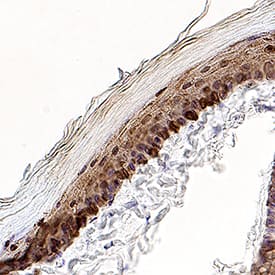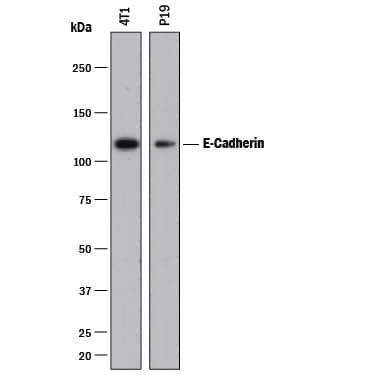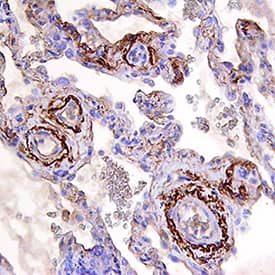Human TBK1 Antibody Summary
Met1-Gly121
Accession # Q9UHD2
Customers also Viewed
Applications
Please Note: Optimal dilutions should be determined by each laboratory for each application. General Protocols are available in the Technical Information section on our website.
Scientific Data
 View Larger
View Larger
TBK1 in Human Prostate Cancer Tissue. TBK1 was detected in immersion fixed paraffin-embedded sections of human prostate cancer tissue using Sheep Anti-Human TBK1 Antigen Affinity-purified Polyclonal Antibody (Catalog # AF9934) at 3 µg/mL overnight at 4 °C. Tissue was stained using the Anti-Sheep HRP-DAB Cell & Tissue Staining Kit (brown; CTS019) and counterstained with hematoxylin (blue). Specific staining was localized to cytoplasm in epithelial cells. View our protocol for Chromogenic IHC Staining of Paraffin-embedded Tissue Sections.
 View Larger
View Larger
Detection of Human TBK1 by Simple WesternTM. Simple Western lane view shows lysates of Daudi human Burkitt's lymphoma cells, and HeLa human cervical epithelial carcinoma cells, loaded at 0.2 mg/mL. A specific band was detected for TBK1 at approximately 90 kDa (as indicated) using 20 µg/mL of Sheep Anti-Human TBK1 Antigen Affinity-purified Polyclonal Antibody (Catalog # AF9934) followed by 1:50 dilution of HRP-conjugated Anti-Sheep IgG Secondary Antibody (Catalog # HAF016). This experiment was conducted under reducing conditions and using the 12‑230 kDa separation system.
Preparation and Storage
- 12 months from date of receipt, -20 to -70 °C as supplied.
- 1 month, 2 to 8 °C under sterile conditions after reconstitution.
- 6 months, -20 to -70 °C under sterile conditions after reconstitution.
Background: TBK1
TANK binding kinase-1 (TBK1), encoded by the TBK1 gene, is a multimeric Serine/threonine-protein kinase that mediates a crosstalk between the innate immune response and autophagy. TBK1 was first identified as a TANK-interacting protein controlling NF-kappa B-mediated responses. Mutations in TBK1 have been found in conditions like amyotrophic lateral sclerosis (ALS), frontotemporal dementia (FTD), normal tension glaucoma (NTG) and childhood herpes simplex encephalitis (HSE). Gain-of-function of TBK1 are associated with NTG, whereas loss-of-function mutations result in ALS/FTD or in HSE.
Product Datasheets
FAQs
No product specific FAQs exist for this product, however you may
View all Antibody FAQsReviews for Human TBK1 Antibody
There are currently no reviews for this product. Be the first to review Human TBK1 Antibody and earn rewards!
Have you used Human TBK1 Antibody?
Submit a review and receive an Amazon gift card.
$25/€18/£15/$25CAN/¥75 Yuan/¥2500 Yen for a review with an image
$10/€7/£6/$10 CAD/¥70 Yuan/¥1110 Yen for a review without an image















